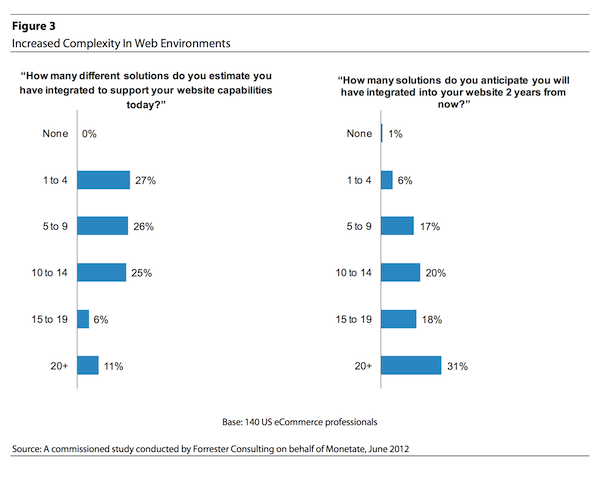
How many different solutions do you estimate you have integrated to support your website capabilities today? How many do you anticipate you will have integrated into your website 2 years from now?
For eCommerce professionals, the answers are surprising:
- 42% have 10 or more solutions integrated in their sites today
- 69% expect 10 or more solutions integrated in their sites within 2 years
- 31% expect 20 or more solutions integrated in their sites within 2 years
- only 6% expect 1-4 solutions integrated in their sites within 2 years
Even to a marketing technology polyglot such as myself, that’s staggering.
Yet, upon reflection, quite plausible.
This data comes from a new Forrester paper commissioned by Monetate, Getting the Most from Your Replatforming Project, interviewing 140 eCommerce professionals. (“Replatforming” is the term when an eCommerce site moves from one platform to another. It can also apply to other marketing platforms, such as CRMs and marketing automation systems.)
Admittedly, eCommerce tends to be more technologically complex than other online marketing and customer experience vehicles. But I suspect that most digital marketers feel the number of moving parts in their universe are increasing, not decreasing, for the foreseeable future.
In spite of all the forces for M&A consolidation and grand visions for the “one suite to rule them all,” the evidence suggests that the trend is moving towards more heterogeneity in the digital marketing ecosystem, not less. At least in Forrester’s study, the motivation is straightforward: it’s what needs to be done to grow the business and remain competitive.
The reality of this increasing technological complexity is evident in the “best practices” that emerged in Forrester’s research. Although only 34% of the participants identified themselves as belonging primarily to IT, the consensus of recommendations were around more rigorous testing methodologies, more in-depth architectural reviews, and more technical due diligence on vendors. The technical fluency required of — and demonstrated by — leaders in marketing, customer service, and eBusiness is increasing.
Also seems likely that more marketing departments will have a chief technologist, no?



